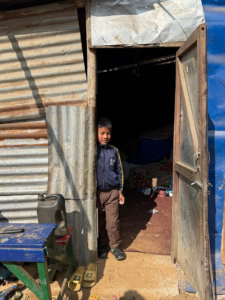This article challenges us all, taking aim at the sin of materialism. For another great article by Nadine (after you read the one below), see "Sharing our Wealth vs Financial Abuse."
I write on many controversial topics, but none has made people clutch their pearls as much as when I talk about materialism. The reactions go from being offended to reasoning out of being accused of greed to condescending comments. Only a tiny minority agrees with me on this topic. So I am definitely not writing this one for views or “likes.”
I will start where I always start: Jesus’ example. Jesus lived a simple life. He did not own much, he did not care for the trappings of a comfortable life, and he trusted God for his subsistence. That is our role model; let us remember that as we examine the topic of materialism. That is what we pledged when we chose to follow him.
Jesus also talked about money a great deal (quoting just a few): “No one can serve two masters. Either you will hate the one and love the other, or you will be devoted to the one and despise the other. You cannot serve both God and money.” (Matthew 6:24); “Sell your possessions and give to the poor. Provide purses for yourselves that will not wear out, a treasure in heaven that will never fail, where no thief comes near and no moth destroys. For where your treasure is, there your heart will be also.” (Luke 12: 33-34; “The seed falling among the thorns refers to someone who hears the word, but the worries of this life and the deceitfulness of wealth choke the word, making it unfruitful.” (Luke 13:22); “Then he said to them, “Watch out! Be on your guard against all kinds of greed; life does not consist in an abundance of possessions.” (Luke 12:15); “John answered, “Anyone who has two shirts should share with the one who has none, and anyone who has food should do the same.” (Luke 3:11)
If we claim to obey the Bible, there could not be any clearer teaching on sharing, giving, and supporting people in need. I know that so many preach about the inerrancy of the Bible, however, this passage seems to elude them most of the time. Much of Christianity has been dominated by the Western world, the richer world, the more comfortable world. We often buy what we desire, not what we need. We also usually buy without considering how our spending affects our brothers and sisters who we claim are “family”. Yet in all my years in churches, I have a hard time remembering sermons on materialism. I have heard plenty of sermons on commitment, evangelism, contribution, and purity, but hardly ever on greed and materialism.
Let me give you a few examples. This will sting, and I do not apologize. I try to think in the spirit of Jesus here. 1) We spend obscene amounts of money on our appearance (hair, clothes, nails, etc) when our neighbors in our own cities can barely make ends meet. 2) We go on fancy holidays when little children around the world barely eat one meal a day. 3) We eat out often instead of cooking at home and being hospitable when some in our congregations struggle to put food on the table. 4) We build beautiful church buildings when some can barely afford rent. 5) We have homes full of “stuff” when millions are homeless or live in abject poverty. 6) We own several cars (often fancy ones) when many struggle with public transport. And the list could go on and on.
I live in a country where the average person can only afford to eat meat once a month and the “normal” salary is $200 a month for college graduates in the main capital city (lower in the rural areas). I volunteer at a school for children from a very underprivileged background who live in tin huts. Their families can barely afford one meal a day (we feed the children at the school). In our western cities, the number of people who live on the streets is appalling. Loneliness and mental health are at a crisis. Poverty is not just material.
What is our responsibility as followers of Jesus? We may not have the ability to fix the root problems of poverty, but we can certainly share our wealth. And out of decency and respect for the ones who are struggling, how about we do not splurge? Of course, if you have worked hard and you have a decent income, it is fine to enjoy some nice things. Let’s make sure you share though. We should be known for our generosity. And let us always ask yourselves the question, “Do I need this? Could I spend my money in a more equitable way?”
The response I often get is, “Don’t make us feel guilty!”. Well, my answer is, “There is a good guilt and there is bad guilt.” I pray we feel good guilt and share! I am afraid that money can rot our souls if we are not careful. The accumulation of “stuff” isolates us from our neighbors and blinds us to the needs of this world. Selfishness takes over unless we are intentionally generous. Our hearts can become hard. And then we get to the point where we call compassion and empathy “toxic” qualities. The joy leaves our eyes. I shudder to think of what Jesus would make of that.
I would really encourage us to step out, visit our neighbors in their time of need, open our doors, our hearts, and our wallets. And I really appreciate the ones who do that already. In my line of work, I get to meet those generous and kind souls who call me higher. — Nadine Templer

Most of the students of the Asha School in Kathmandu, Nepal, live in tin huts. This is Rakesh’s house.









